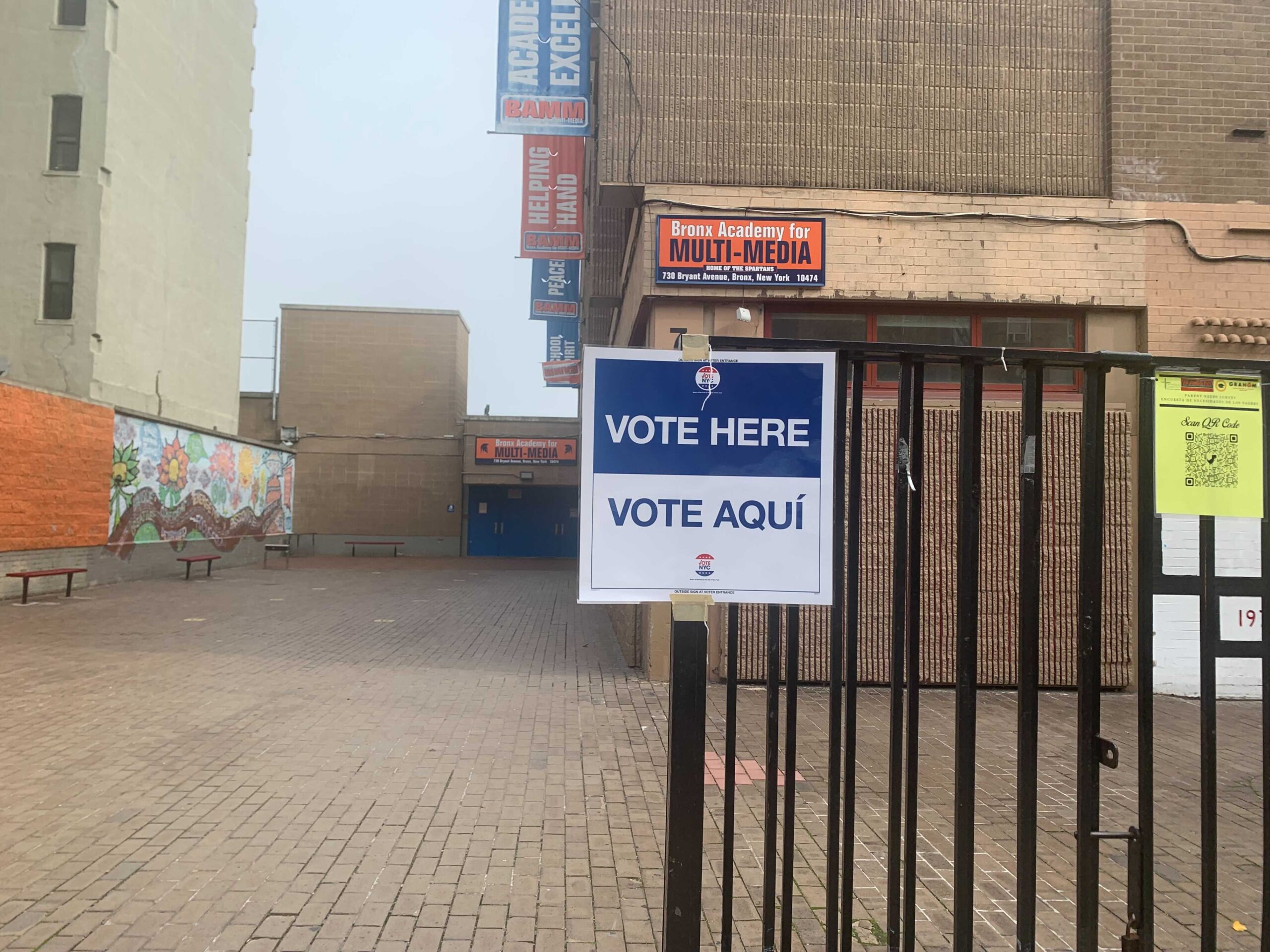South Bronxites went to the polls on Tuesday, with some familiar themes in mind. Some voters worried about rising violent crime rates, while others raised concerns about underfunded schools and the lingering pandemic.
Citywide as well as in The Bronx, voters overwhelmingly cast their ballots for current former NYPD officer and Brooklyn Borough President Eric Adams as New York City’s new mayor.
Para leer opiniones de los votantes en español vaya a esta version.
Adams tallied more than 66% of the vote to Sliwa’s 28% in the five boroughs, making him just the second Black mayor in city history.
Voters across The Bronx elected sitting City Councilwoman Vanessa Gibson as their next borough president, replacing Ruben Diaz Jr., who was term-limited out after 12 years in the position.
Gibson’s Republican opponent, Janelle King, never mounted a serious challenge. King is listed with a Soundview address, but she has no website.
With nearly 100% of the votes counted borough-wide, Gibson has 88,033 votes to King’s 15,126, and 7,276 for former 41st Precinct (Hunts Point) police officer Sammy Ravelo, who ran on the Conservative ticket.
Locally, incumbent City Council members Rafael Salamanca Jr. and Diana Ayala sailed to victory in uncontested races.
Mott Haven voter Debbie Caraballo said she voted for Adams for mayor, expecting that “he’s gonna try to clean the streets and protect us more. He’s gonna try to have more cops out there, because there’s a lot of things that’s been going on since the pandemic.”
Mel Martinez, who works at the Hunts Point Food Distribution Market, also liked Adams for his public safety platform.
“There’s a lot of crime, robbery, knives guns,” said Martinez. “That’s what we need, safety and I got three kids. I want a safe place to live. What I want for safety is more cops on the street. Right now, we see no cops.“
For other voters, health care was key.

“We need better healthcare,” said Hunts Point retiree Eleanor Escalera. “Without your health, where are you?”
Chanel Mitchell, an after-school worker in Mott Haven, listed COVID-19 as her primary worry, “because not everybody wants the vaccine, and everybody has a right to control their own body.”
Longwood resident Anthony Jones hopes to see officials handle the COVID-19 pandemic better. Jones, a filmmaker, said he wished more of his fellow New Yorkers had paid attention to the health department’s warnings.
“I mean, I guess if people would have listened a couple of months ago when people were telling them to wear a mask, we wouldn’t have gotten to the mandate,” Jones said.
In Mott Haven, where one out of every six residents has been diagnosed with COVID-19 according to NYC Health, death rates remain among the highest in the city.
For Melrose resident Lisa Rivera, 55, investing in schools is the priority.
“The injustice being done here in my district, with the kids,” was Rivera’s main issue. “We could have a future president, a future governor here. But they just don’t care about this district because we’re a poor community.”

Melrose voter Derrick Miles, 55, sounded the alarm about fundamental civil rights and voter protection on the national stage.
“Part of the way you protect your civil rights is, you exercise them,” said Miles, who coaches youth basketball. “Part of the way in which voter suppression occurs in Texas and Georgia and Virginia, is people not exercising their civil rights. Here in New York, we have the freedom to vote.”
Similarly, Hunts Point caseworker Sonia Thomas worried about “voter registration, more specifically, voter registration restriction and having them lifted.”
For another Melrose voter, Ruth Stone, affordable housing trumped other issues.
“We need to keep the homeless people off the street,” said Stone, 64. “I’ve never seen this many people homeless before. Make rent affordable. Rent today is too high — if you pay your rent, you can’t eat, unless you have stamps.”
“Equality across the board,” said Young. “Financial equality, housing equality, job opportunities, healthcare, it’s just so bad for the working class and working families in the community.”
Small business owner Bia Ortiz, who is also a student at Baruch College and mother of two, noticed many of her peers not wanting to vote in this election cycle.
“I noticed a lot of folks think, oh, this doesn’t really count,” she said. “The process and having an understanding in terms of the process and purpose of voting…it makes a difference.”
One voter said the choice was obvious, even though he was the only one the Herald/Express interviewed who brought it up.

“Probably climate change,” said Longwood retiree John Veranes. “And it’s obvious. There’s no need to explain. We hear it every day and nobody does anything about it.”
First time voter Taina Torruella, a community ambassador for the educational nonprofit Hunts Point Alliance for Children, said she found the new experience eye-opening.
“I didn’t vote in the presidential elections because I thought it did not matter,” said Torruella. “I have realized now that every vote counts and that I can make a difference.”
According to the Board of Elections, nearly 88,000 Bronx voters voted early this year.

